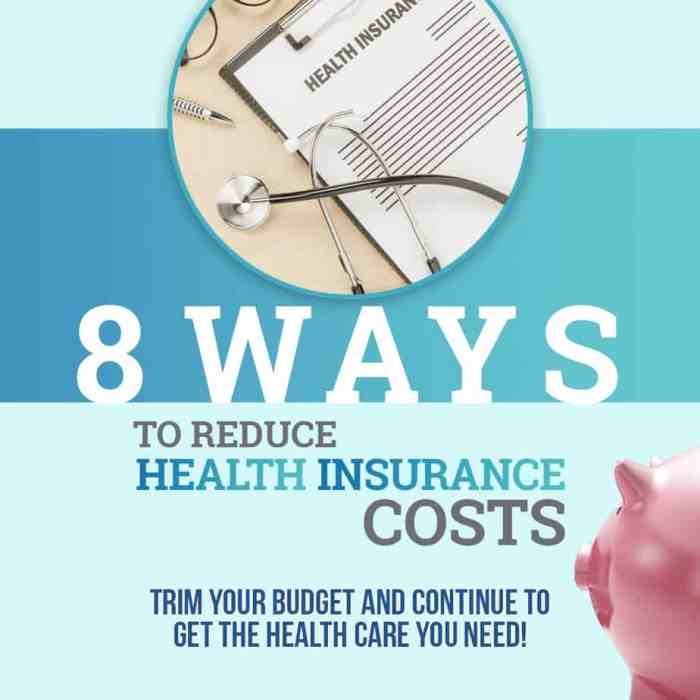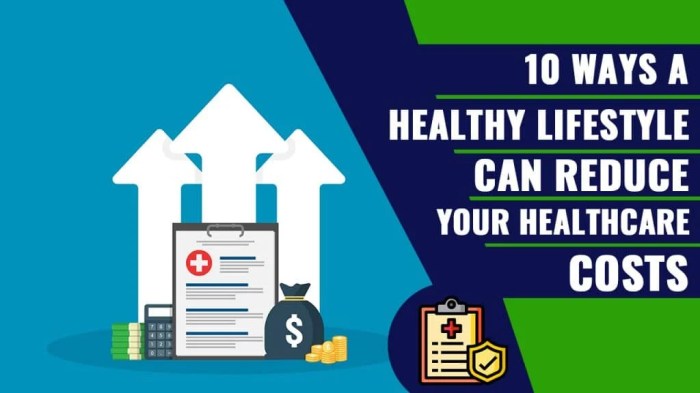Embark on a journey towards better health and financial savings with Healthy Living Habits That Reduce Insurance Costs. Discover how simple lifestyle changes can not only boost your well-being but also trim down your insurance expenses.
Explore the impact of diet, exercise, preventive screenings, and stress management on your overall health and insurance premiums.
Healthy Diet
Eating a nutritious and well-balanced diet is essential for maintaining good health and potentially reducing insurance costs. A healthy diet can help prevent chronic diseases, boost the immune system, and improve overall well-being, leading to lower medical expenses and insurance premiums.
Examples of Foods for a Healthy Diet
- Fruits and vegetables: Rich in vitamins, minerals, and antioxidants.
- Whole grains: Provide fiber, essential nutrients, and sustained energy.
- Lean protein sources: Such as poultry, fish, beans, and nuts.
- Healthy fats: Found in avocados, nuts, seeds, and olive oil.
- Dairy or dairy alternatives: For calcium and vitamin D.
Impact of a Balanced Diet on Health and Insurance Costs
A balanced diet can significantly reduce the risk of developing chronic conditions like obesity, heart disease, diabetes, and certain cancers. By maintaining a healthy weight and consuming nutrient-dense foods, individuals may require fewer medical interventions and medications, ultimately leading to lower healthcare expenses and insurance premiums.
Regular Exercise

Regular exercise plays a crucial role in maintaining good health and reducing the risk of chronic diseases. It is also linked to lower insurance costs due to its positive impact on overall well-being.
Types of Exercises
- Cardiovascular exercises: Activities like running, cycling, and swimming improve heart health and boost endurance.
- Strength training: Lifting weights or using resistance bands helps build muscle mass and increase metabolism.
- Flexibility exercises: Yoga and stretching exercises enhance flexibility and reduce the risk of injuries.
- Balance exercises: Tai Chi or specific yoga poses can improve balance and stability, especially in older adults.
Connection to Health Benefits
Regular physical activity has been shown to lower the risk of developing conditions such as heart disease, diabetes, and certain types of cancer. Exercise also helps improve mental health, reduce stress, and enhance overall quality of life.
Lower Insurance Costs
Staying active through regular exercise can lead to lower insurance costs by reducing the likelihood of chronic diseases and associated medical expenses.
Insurance providers often offer discounts or incentives for policyholders who demonstrate a commitment to maintaining a healthy lifestyle through exercise.
Preventive Health Screenings
Regular preventive health screenings are essential for maintaining overall well-being and catching any potential health issues early on. By staying proactive with these screenings, individuals can reduce the risk of developing serious medical conditions and ultimately save on healthcare costs in the long run.
Common Preventive Screenings
- Blood Pressure Monitoring: Helps in early detection of hypertension.
- Cholesterol Level Check: Identifies risk factors for heart disease.
- Blood Sugar Test: Screens for diabetes and insulin resistance.
- Colonoscopy: Detects early signs of colon cancer.
- Mammogram: Screening for breast cancer in women.
Benefits of Early Detection
Regular screenings can lead to early detection of health issues, allowing for timely intervention and treatment. By addressing problems in their initial stages, individuals can avoid the need for expensive medical procedures or prolonged treatments. This not only improves health outcomes but also helps in reducing healthcare costs significantly.
Insurance Incentives
Insurance companies often encourage policyholders to participate in preventive health measures by offering incentives such as discounted premiums, cash rewards, or coverage for screenings without additional costs. By taking advantage of these incentives, individuals can prioritize their health and well-being while also saving money on healthcare expenses in the future.
Stress Management

Stress management plays a crucial role in maintaining overall health and well-being. Not only does excessive stress impact our mental and emotional state, but it can also have negative effects on our physical health. In the context of insurance, high levels of stress can lead to increased healthcare costs and insurance premiums.
Effective Stress-Reducing Techniques
- One effective stress-reducing technique is meditation. Taking a few minutes each day to practice mindfulness can help calm the mind and reduce stress levels.
- Yoga is another beneficial practice for stress management. The combination of gentle movements, breathing exercises, and meditation in yoga can help lower stress hormones in the body.
- Engaging in regular physical activity, such as jogging or swimming, can also help alleviate stress and improve overall mental well-being.
Impact of Stress on Health and Insurance Premiums
Stress has been linked to a variety of health issues, including high blood pressure, heart disease, and weakened immune system. These health conditions can lead to more frequent doctor visits, medications, and treatments, ultimately resulting in higher healthcare costs and insurance premiums.
Cost Savings through Stress Management Practices
By incorporating stress management techniques into your daily routine, you may experience potential cost savings on insurance. Lowering stress levels can help prevent chronic health conditions, reduce the need for medical interventions, and ultimately lead to fewer insurance claims. Investing in stress management practices now can lead to long-term savings on healthcare expenses and insurance premiums.
Final Summary

In conclusion, prioritizing healthy living habits not only enhances your quality of life but also helps in cutting down insurance costs. By making smart choices today, you pave the way for a healthier and more economical future.
FAQ Insights
What are some examples of foods that contribute to a healthy diet?
Some examples include fruits, vegetables, whole grains, lean proteins, and healthy fats.
How does maintaining a healthy weight impact insurance premiums?
Maintaining a healthy weight can often lead to lower insurance costs as it is linked to reduced health risks.
What types of exercises promote good health?
Exercises like cardio, strength training, and flexibility exercises all contribute to overall well-being.
Why are preventive health screenings important?
Preventive screenings can help in early detection of health issues, preventing the need for expensive treatments later on.
How does stress impact insurance premiums?
High stress levels can negatively affect health, potentially leading to higher insurance costs.












